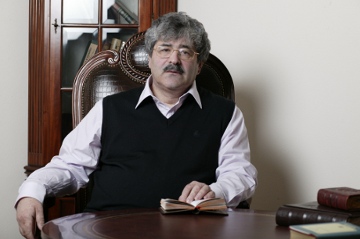
A Western journalist boorishly asked Kirsan Ilyumzhinov, former head of Russia's Kalmykia and acting president of the World Chess Federation (FIDE) who was giving a press conference in the wake of a tour of Libya, whether he had asked for NATO permit to cross into the country. Asking the media man if parents or anyone else had taught him the ill manners would have been a legitimate, though undiplomatic response, but Ilyumzhinov chose to reply with his ordinary politeness and simply explained that FIDE president had no reasons to notify NATO or any other group of his travel plans. Skipping the portion of the event that could spiral into debates, Ilyumzhinov conveyed the clear message that the Libyan leadership was open to immediate talks with NATO and the Benghazi rebels.
To an extent, the bizarre notion that it takes a kind of permit to get in touch with Tripoli reflects a wider situation – at the moment, Libya is isolated and technically has no way of communicating with the outside world from its neighbors to Europe or with the international community as a whole. As a result, they have to suffice with the accounts dished out by obviously biased politicians, the NATO top brass, and the Western media which tend to mix post factum comments into the footage, thus rendering the coverage unrelated to reality. It appears that all propaganda machines operate by the same rules regardless where and when. In contrast, the whole concert of Western TV channels, as well as the Russian ones, remain accessible in Libya. According to Ilyumzhinov, Libyans often find the Western reporting completely laughable. He said in an exclusive interview to the International Affairs correspondent that he traveled across roughly half of Libya including quite a few towns and villages the Western media claimed to be in the hands of rebels or trapped in ferocious fighting at the time, but saw a completely different picture. On the way back to the Tunisian border, Ilyumzhinov passed Zawiya exactly on the date when it was described as having been taken by the rebels, but drove through the city with no signs of military activity popping up in sight. The original UN resolution, it must be noted, was not intended to impose an information blockade or any kind of censorship regime on Libya.
The objective reality in Libya has nothing to do with the NATO fantasies. The alliance urges the rebels to be more aggressive while they constantly beg for greater intensity of air raids. Backing the rebels, NATO fans the hostilities and, no doubt, the alliance plans that the civilian conflict in Libya will continue until Gaddafi is swept off the political chessboard. As of today, hardly anyone would argue against the truth that, from the outset, NATO has been pursuing far-reaching political objectives in Libya under the pretext of shielding the civilian population. Consequently, Gaddafi's calls for suspending the air raids and negotiating have no chance of being heard – what the Western coalition wants is to fight the war to the end.
Ilyumzhinov saw hospitals and residential quarters in Libya in ruins, and had enough political courage to offer Gaddafi condolences in connection with the deaths of the Libyan leader's two-year old grandsons and two-month old granddaughter who had been killed in one of the bombings of Tripoli. Certainly, the deaths of children in Libya due to NATO air strikes deserve a line on the agenda of the International Criminal Court, and it would be terribly wrong if, as before, a UN resolution will be cursorily cited to write off the killings.
Talking to Ilyumzhinov, Gaddafi dropped a hint concerning the economic aspect of the offensive against Libya. He stressed that Libya's currency holdings – a total of $160b – are frozen on foreign bank accounts and that, contrary to widespread allegations of the funds somehow being at his own disposal, the money belongs to the Libyan central bank, state-run corporations, and citizens. The money is used to strengthen the Euro, to solve the West's problems, but those who withhold it would never talk about the real purpose of the seizure, said Gaddafi.
It is well-known that Libya decided against the cultivation of nuclear, chemical, or biological warfare, and, moreover, maintained no missile program. Gaddafi told Ilyumzhinov that the resources saved on rearmament initiatives were in part allocated to a railroad project, and that Russia won the corresponding construction tender. Gaddafi made the point that countries like North Korea, Iran, etc. would have to learn a lesson from the developments around Libya, which, after he was coerced into giving up plans for WMD arsenals, became an easy target for those who rely on pressure and force.
<!--[if gte mso 9]> <!--[if gte mso 9]> Normal 0 false false false RU JA X-NONE <!--[if gte mso 9]> <!--[if gte mso 10]> /* Style Definitions */ table.MsoNormalTable {mso-style-name:"Обычная таблица"; mso-tstyle-rowband-size:0; mso-tstyle-colband-size:0; mso-style-noshow:yes; mso-style-priority:99; mso-style-parent:""; mso-padding-alt:0cm 5.4pt 0cm 5.4pt; mso-para-margin:0cm; mso-para-margin-bottom:.0001pt; mso-pagination:widow-orphan; font-size:10.0pt; font-family:"Times New Roman";} <!--StartFragment--> In Ilyumzhinov's view, Gaddafi looked completely adequate. The Libyan leader did not hole up in a bunker and did not give an impression of a man worried about his own future, but his grief after the deaths of the loved ones was impossible to conceal. 'I know they have sentenced me and my relatives to death,- said Gaddafi – but what has the tiny baby-girl done to them?' <!--EndFragment-->
read more in our Telegram-channel https://t.me/The_International_Affairs

 15:51 16.06.2011 •
15:51 16.06.2011 •






















